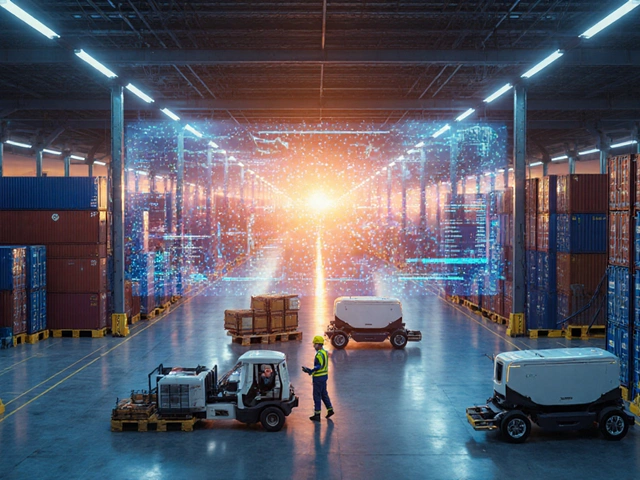How many people actually dream of being a logistician as a kid? Probably not a lot. Yet here’s a wild statistic—by 2024, over 290,000 people in the US alone work in logistics and supply chain jobs. They’re the ones making sure your Amazon Prime order arrives when it’s supposed to, keeping hospitals stocked with the right medication, and making sure your local grocery store doesn’t run out of bread. But what’s hiding behind this curtain of efficiency? A mountain of pressure, fast decisions, and fires to put out. The question isn’t just whether logisticians face stress—sometimes it’s how they manage not to explode from it.
The Daily Reality of a Logistician’s Job
Logisticians love to say no two days are the same, and they’re not kidding. One minute, they're tweaking a supply route to save $10,000. The next, a truckload of pharmaceuticals gets stuck at customs, and every minute ticks down to a hospital crisis. You might think a logistician just moves boxes around, but it’s really about solving giant puzzles with missing pieces and a countdown clock. And get this: during the COVID-19 pandemic, companies saw logistics as a lifeline. One 2023 survey from Gartner showed that 57% of supply chain leaders ranked logistics roles among their top three for stress levels—beating out finance and even IT.
Here’s the kicker: much of the stress isn’t about heavy lifting or spreadsheets, but about unpredictability. Ever tried finding a last-minute truck driver during a blizzard? Or explaining to a frantic CEO why a ship full of inventory is stuck halfway across the world because a port shut down? Delays, breakdowns, border issues, and freak weather events become part of everyday conversation. Tech failures? Yeah, those too. Sometimes, just a glitch in the tracking system can make an entire team scramble to recover lost time.
People outside the industry rarely see this. They just spot the final product at the store. But logisticians are on the phone with customs officers at 2am, smoothing over miscommunications between suppliers who speak five different languages, and fielding angry emails from every side. You want to know what multitasking looks like? Step into a logistics control room during peak season. Double screens, ten open chats, ringing phones, and sticky notes everywhere. The average logistician’s workload spikes by 50% between Thanksgiving and Christmas in retail supply chains. The stress is real—especially when ‘one small mistake’ could mean thousands lost or entire shelves empty.
The weird thing? Many logisticians secretly love this adrenaline rush. It’s like being a crisis manager and chess grandmaster rolled into one. Tracking moving parts, anticipating hiccups, then pulling off a miracle at the last second gives a strange sense of satisfaction. But let’s not sugarcoat it: this job can eat you alive if you’re not careful. Balancing the high-stakes environment with keeping your sanity is the real game.
Stress Triggers: What Keeps Logisticians Up at Night?
Every job has that ‘thing’ that makes you lose sleep, but logisticians have a laundry list. Top of the pile? Logistician stress mostly comes from a handful of notorious triggers. Think hard deadlines, razor-thin profit margins, and no room for errors. If that shipment of spare auto parts is a day late, an entire factory could grind to a halt. Every hour counts, and sometimes you’re one stuck truck away from a five-figure loss.
Let’s talk about customers. Some companies call logistics the ‘invisible backbone,’ but trust me, when something goes wrong, it’s the first place fingers get pointed. You’re not just dealing with your own team—there are suppliers, drivers, dock workers, IT support, customs agents, and sometimes even government agencies involved. If even one person misses a step, everything can unravel. During the shipping crisis of 2021, US ports handled a record 25 million containers—and there was still a painful backlog. For logisticians, this kind of surge turns every day into a battle with chaos and constant phone calls.
Then there’s technology. Sure, digital tools are supposed to make life easier. AI forecasting, tracking dashboards, and automation all sound great, right? Until the system crashes right before an urgent delivery window, and suddenly it’s back to spreadsheets, texts, and a healthy dose of panic. About one-third of logistics managers in a 2025 poll said that tech failures cause more stress than natural disasters—because you can plan for storms, but a system crash feels like sabotage from the inside.
Global events also pop up like landmines. Ever see the Ever Given ship stuck in the Suez Canal? In March 2021, one container ship blocked 12% of daily global trade for six days. That one event cost an estimated $9.6 billion in trade losses a day—and legions of logisticians had to reroute, reschedule, and reassure angry customers. Geopolitical tensions, regulatory changes, and sudden strikes? Logisticians watch news feeds as closely as weather apps, because any headline can mean reworking a month’s plan overnight.
Let's put some numbers to all this:
| Stress Trigger | Percent of Logisticians Affected (2025 Data) |
|---|---|
| Deadlines & Late Deliveries | 68% |
| Tech Failures | 34% |
| Labor Shortages | 49% |
| Unpredictable Global Events | 42% |
| Customer Complaints | 58% |
If you ever hear a logistician mutter “just another normal day,” read between the lines—it probably means their stress tolerance is off the charts.

Spotting the Signs: How Stress Sneaks Up in Logistics
You’d think people who spend their days solving problems would be naturals at fending off stress. The reality? Many logisticians don’t notice the warning signs until they’re deep in burnout. Heads up if you’re just starting—these cues are your flashing red lights. Classic sign number one: you take your work phone everywhere, even on ‘vacation.’ If a weekend feels like an anxious waiting game, or you’re checking for shipping updates at dinner, you’re in the danger zone.
Here’s what really happens on the inside: your body doesn’t know if the stress is from a wild bear attack or an angry client demanding updates at midnight. The same hormones kick in—cortisol, adrenaline, all that jazz. Over time, that can mean headaches, trouble sleeping, and even heart issues. A study published in the Journal of Occupational Health Psychology in May 2024 found that logistics workers have a 38% higher risk of sleep disorders than the national average. Daytime fatigue, snapping at coworkers, and forgetfulness aren’t just ‘part of the job’—they’re warning bells.
Mental health is part of the story, too. The pressure to always be ‘on’ wears you down. Some folks become perfectionists, obsessing over every detail. Others go numb, just bulldozing through tasks—until they crash. A lot of logisticians try to shrug this off as grit, but ignoring it piles up problems. Relationships at home can crack under the strain. And let’s be real: nobody brags about missing their kid’s birthday because of an ‘emergency’ container reroute.
So, what can you do if you’re starting to feel the pinch? Don’t wait for a meltdown. Some logistics companies have started running on-call rotation systems, so people can actually unplug. Others have hired ‘stress coaches’—actual humans, not another fancy app—who focus on keeping the team sharp, not burned out. Good managers watch for rising mistakes or mood swings as early red flags. If there’s one thing most seasoned logisticians agree on, it’s that asking for help is not a sign of weakness. It’s pure survival.
For anyone feeling stuck, here are some battle-tested tips passed around the logistics water cooler:
- Set hard boundaries—turn off alerts outside of work hours or use a dedicated work phone (and leave it in the kitchen at night).
- Prep a daily contingency checklist so you’re never totally blindsided when (not if) things go sideways.
- Build a network—good relationships with drivers, customs agents, and even competitors can turn a crisis into a quick favor.
- Schedule midday breaks, even just 10 minutes to reset. A short walk beats an energy drink meltdown every time.
- If things get bad, consider outside support. Plenty of logistics workers use EAPs (Employee Assistance Programs) or short counseling sessions to stay grounded.
This job rewards tough minds and flexible routines, but there’s no bonus for burning out. Pay attention before stress sneaks up—you’re no good to the team if you’re running on fumes.
Why Some Thrive Under Pressure: Making the Most of the Logistics Hustle
You’ll meet logisticians who swear that the worst days make them feel most alive. There’s a real thrill in beating impossible odds, especially when nobody else even realizes how close everything came to unraveling. The best logistics pros don’t just survive chaos—they ride it. It’s the difference between the people who panic at a traffic reroute and those who immediately come up with three alternate plans before anyone else notices a detour.
If you want to last in this job, attitude counts as much as any skill. People who thrive are usually the ones eager to learn, not flustered by curveballs. They turn ‘impossible’ phone calls into ‘let me see what I can do.’ Curiosity helps, too—the world of logistics is a living lab of new tech and constant change. Keeping a beginner mindset and celebrating small wins doesn’t just boost team morale, it can actually train your brain to stay cool under fire.
Let’s talk numbers for a second: the demand for logisticians is up 18% since 2020, and median pay in the US topped $79,400 in 2024. Those who stick with it say the rewards aren’t just about money, though. It’s being the unsung hero who gets things done, quietly knowing that Facebook Marketplace, hardware stores, and food deliveries all run smoother because you made the right call. Employers who understand this edge now offer flexible schedules and extra paid time off during slow seasons—anything to keep their people sharp and not wiped out.
If you’re considering this job or already knee-deep in the action, here’s a pro tip: don’t just measure yourself by the number of fires you put out, but by how you bounce back from them. Keep records of problems you’ve solved (even the small ones)—it’s a game-changer during performance reviews or when you swap jobs. Most important? Find ways to savor the rare, peaceful days. Because when your phone’s not buzzing with crises, you know you’ve tamed the beast—at least for now.
Stress in logistics isn’t going anywhere. That’s just the nature of moving the world’s stuff on time. But with the right habits, a smart team, and a touch of grit, this career isn’t just survivable—it can be a wild, satisfying ride.





